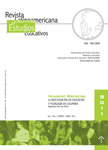Authors
Abstract
In order to establish the investigative regions emerging from the research production privileged by the Doctoral Program in Education in the Faculty of Education at Universidad de Antioquia, this article presents the results of the analyticalcomprehen sive work carried out on the specific universe represented by the set of all the PhD Program theses submitted at Universidad de Antioquia, approved and presented publicly in the period between 2000 and 2010. Cartography is defined here in terms of a descriptive exercise on one side and an analytical interpretation on the other hand, from which specific but related meanings that constitute the landscape of investigative regions on the field of this set of documents emerge. Quite defined research interests were found as far as the clarification of cognitive processes involved in learning and communicative competences development focused on reading-writing skills in school populations at intermediate levels (lower Secondary School levels) and the role in the implementation hypermedia resources, today known as ICTs, play on them. The interest in the history of pedagogical practices and in educational models in institutional settings in some historical periods in the country, emerge in lesser intensity. Theoretical and methodological perspectives of an empirical analytical macroregional in the first macro-regional block, and of a critical social nature in the second macro-regional block mark an interesting thematic, methodological and theoretical contrast among which emerge some interregional discontinuities which allow to establish a diverse investigative in the investigative intensity of this center of academic excellence.
References
Equipo periodístico del Periódico Alma Mater. (2002). “Recibieron el título los primeros Doctores en Educación: Quintero Corzo, Josefina; Tapiero Vásquez, Elias”. En: Alma Mater. Universidad de Antioquia. (Medellín), No. 496, p. 23
_____________. Doctorado en Educación. (2002). En: Alma Mater. No. 503., p. 31
_____________. Doctorado en Educación. (2005). en la ruta de la acreditación internacional. En: Alma Mater. No. 538, p. 28-29
Pintos, J. L. (2002). “El Metacódigo relevancia y opacidad en la construcción sistemica de las realidades”. Revista Investigaciones políticas y sociológicas. No 1-2, Vol 2, pp. 21-34. Manizales. Facultad de CC.PP. y sociales de la USC.
Porta, Luis & Silva, Miriam. (2003). “La investigación cualitativa: El Análisis de Contenido en la investigación educativa” En: http://www.uccor.edu.ar/paginas/REDUC/porta.pdf
Quiroz-Posada, Ruth Elena; Díaz-Monsalve, Ana Elsy. (2007). “Estado del conocimiento sobre las investigaciones en didáctica de las ciencias sociales, en la universidad pública colombiana entre 1970 y 2006”. Medellín: U de A. En: http://redcolombianadcs.blogspot.com/ [Consultada Julio de 2011]
Restrepo-Gómez, Bernardo. (1997). “Significados predictivos del advenimiento del Doctorado enEducación. Lección Inaugural del Doctorado de la Universidad de Antioquia. Septiembre 12 de 1997”. En: Cuadernos Pedagógicos. (Medellín, U de A), No. 02, Mar. 1998, pp. 7-16
Timaná-Velásquez, Queipo Franco. (1990). “Proyecto de creación de un doctorado en Educación o Pedagogía”. En: Revista Educación y Pedagogía (Medellín), Vol. 01, No. 03, pp. 109-113 En: http://aprendeenlinea.udea.edu.co/revistas/index.php/revistaeyp/article/view/5609/5030 [Consultado: mayo de 2010]
__________. (1997). El doctorado en educación, al consolidar al maestro como investigador, hace cierta la posibilidad de avanzar la frontera del conocimiento en la educación y la pedagogía. En: Cuadernos Pedagógicos (Medellín, U de A), No. 02, Mar. 1998, pp. 27-36
Universidad de Antioquia. (2007). Facultad de Educación. Dpto. de Educación avanzada. Doctorado en Educación. Énfasis en Educación en Ciencias Experimentales. Séptima Cohorte. Medellín, En: http://ayura.udea.edu.co/actualidad/Publicidad_Final_Final.pdf [Consultado: mayo de 2010]

 PDF (Español)
PDF (Español)
 FLIP
FLIP



















